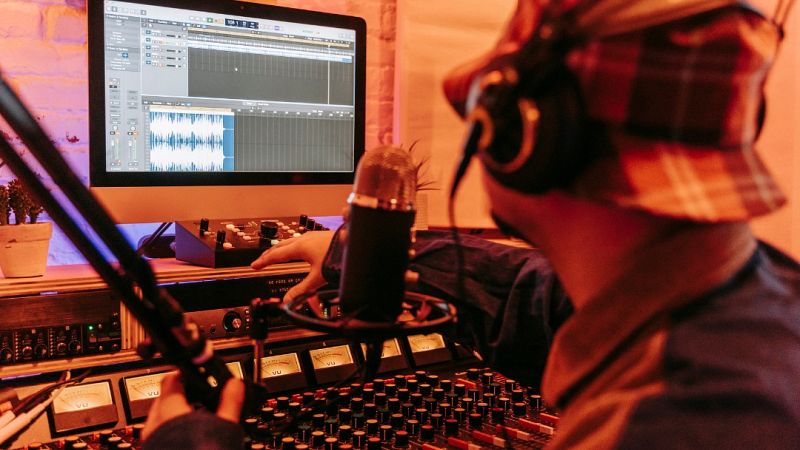Swedish music rights company signs licensing agreement with AI company in ‘world first’

A Swedish music rights society says it has signed the world’s first licensing agreement with an artificial intelligence company (AI).
The Swedish Performing Rights Society (STIM) said it signed the agreement with Songfox, a Stockholm-based start-up that lets fans and creators legally produce AI-generated compositions, on behalf of the group’s 100,000 artists.
Under the deal, Songfox will use a third-party attribution technology called Sureel to trace any AI outputs back to the original human-created work so the artists can get revenue from it.
This agreement “makes revenues auditable in real time and addresses one of the greatest trust gaps in AI music: the lack of transparency over what data is used and how creators are compensated,” STIM said in a statement.
Simon Gozzi, STIM's Head of Business Development and Industry Insight, told Euronews Next that AI firms will pay through a "mix of licensing fees and revenue shares". Artists will also receive an "upfront value" when works are used for training.
The idea is "the more demand an AI service creates, the larger the returns for rights holders," Gozzi said.
This first agreement is a “stress-test” for what the association said should eventually be a market-based model that “secures fair compensation and equal terms of competition.”
"We definitely believe this is the start of something bigger," Gozzi said. "By showing attribution and ring-fencing of AI revenues in practice, we aim to give Europe a blueprint that others can adopt—making this a global standard over time".
AI could strip away almost a quarter of music creators’ revenue in the next three years, according to a study.
What is going on elsewhere in Europe for artists affected by AI?
The news comes a few weeks after groups representing artists told Euronews Next that EU legislation under the EU AI Act does not go far enough to protect artists from copyright infringement.
The law says that artists should opt out if they do not want AI to be trained on their creations, but organisations including the European Composer and Songwriter Alliance (ECSA) and the European Grouping of Societies of Authors and Composers (GESAC) say their members have been unable to do so.
The gaps in the legislation also don’t give artists a way to be remunerated for the work that’s already been scraped by AI, experts said.
Gozzi said he couldn't disclose whether there are any other agreements underway but said the framework is "collective in nature" and not built around one start-up.
He also wouldn't comment on whether the licensing agreement would provide compensation for work that's already been scraped, saying that the "focus is now to bring future use into a rule-based system".
The advocates said the Commission could also mandate that AI companies negotiate blanket or collective licenses with the respective artist groups.
Meanwhile, ECSA and GESAC are waiting for the verdicts of two copyright lawsuits filed by Germany’s Society for Musical Performing and Mechanical Reproduction Rights (GEMA) against OpenAI, the parent company of ChatGPT, and Suno AI, an AI music generation app.
Marc du Moulin, ECSA’s secretary general, previously told Euronews Next that the verdict could determine to what extent AI companies could be bound to copyright laws.
Universal Music Group is also pursuing a copyright lawsuit against AI company Anthropic.
This article has been updated with comment from STIM.
Today

